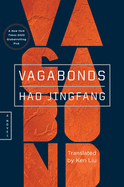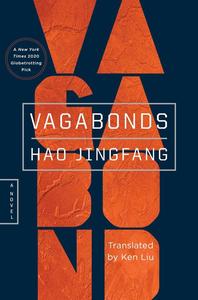
 Hugo Award-winner Hao Jingfang's Vagabonds is a science fiction epic that doubles as a work of philosophy--a novel filled with big ideas about art, competing cultures and so much more. Vagabonds was translated by Ken Liu (The Hidden Girl), an accomplished science fiction author responsible for the translation of Cixin Liu's wildly successful The Three-Body Problem, among others. Hao's novel is a welcome addition to a wave of exciting Chinese science fiction being made available in English. Vagabonds takes place at the beginning of the 23rd century, on a colonized Mars that broke away from Earth many years earlier, after a destructive war.
Hugo Award-winner Hao Jingfang's Vagabonds is a science fiction epic that doubles as a work of philosophy--a novel filled with big ideas about art, competing cultures and so much more. Vagabonds was translated by Ken Liu (The Hidden Girl), an accomplished science fiction author responsible for the translation of Cixin Liu's wildly successful The Three-Body Problem, among others. Hao's novel is a welcome addition to a wave of exciting Chinese science fiction being made available in English. Vagabonds takes place at the beginning of the 23rd century, on a colonized Mars that broke away from Earth many years earlier, after a destructive war.
In an attempt to thaw relations between Mars and Earth, a delegation of young Martians was sent to live on Earth for five years. Vagabonds begins with their return to Mars, many of them unmoored by their experiences in a very different culture. Luoying returns unsure of her place in either world, disturbed by assertions on Earth that her grandfather, the consul of Mars, is a dictator. Meanwhile, Eko, a documentarian from Earth, finds in Mars a utopia of artistic expression, unconstrained by the demands of capitalism. As Eko attempts to follow the footsteps of his old teacher, and Luoying learns more about her deceased parents, the author unfolds revelations and complicates each of their perceptions of Mars.
Hao's greatest achievement is her incredibly intricate rendering of life on Mars, including both its practical realities and its philosophical underpinnings. The Martian colony is an aesthetically striking glass city. On the surface, at least, life on Mars is purposeful, orderly and rigid in comparison to Earth's more chaotic societies. It is easy to start to draw parallels between socialist Mars versus capitalist Earth and competing present-day nations. Hao seems to warn readers away from a simplistic reading, however, writing that Eko "was so steeped in the context of Earth that it was natural for him to fall into the assumptions and political symbolisms prevalent on Earth... there was nothing more dangerous than jumping to conclusions."
Vagabonds is sometimes reminiscent of old-school sci-fi in its reliance on dialogue. Much of the book is made up of lengthy conversations between characters arguing about Mars and what constitutes a healthy society. Hao thankfully avoids the all-too-common habit of making one character her obvious mouthpiece; instead, it's often unclear who is right and who is wrong. Even Luoying's grandfather, the alleged dictator, is treated sympathetically and given a fully coherent ideology. In Vagabonds, the conflict between Earth and Mars is no more important than the conflict between the novel's characters as they struggle to chart a course for their future. --Hank Stephenson, manuscript reader, the Sun magazine
Shelf Talker: Vagabonds is a science fiction epic that uses a cold war between Earth and colonized Mars in the 23rd century as a stage for philosophical debate.

